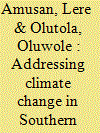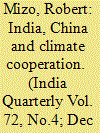|
|
|
Sort Order |
|
|
|
Items / Page
|
|
|
|
|
|
|
| Srl | Item |
| 1 |
ID:
151008


|
|
|
|
|
| Summary/Abstract |
Climate change is a global challenge. Its ramifying effects on both natural and human systems cut across different regions of the world. While Africa as a whole is being confirmed to be more affected by climate change due in part to a relatively low(er) mitigation and adaptive capacity, coupled with a situation where majority of its population depends mainly on natural resources, Southern Africa is singled out as a potentially vulnerable subregion for other additional factors. Representing a milestone in the trajectory of the global climate change process, the 21st session of the Conference of Parties (COP-21) resolved with a consensual climate change deal known as the Paris Agreement. The Agreement, through the instrumentality of a ratchet up mechanism, otherwise described as Intended Nationally Determined Contributions (INDCs), seeks significant cuts in greenhouse gas (GHG) emissions effectively from 2020. In essence, it calls for a novel though gradual shift from carbon-emission approach to low emission development strategy. This, no doubt, is indispensable to sustainable development at all levels. Beyond national commitments as obligatory for parties, there is a need for regional cooperative efforts which should bring about shared appropriate policy responses that promote green energy as well as seize opportunities inherent in it for national and deterritorialised gains. Adopting neoliberal and green theories, the institutional framework of the Southern Africa Development Community (SADC) where South Africa is expected to take a lead is examined in this article.
|
|
|
|
|
|
|
|
|
|
|
|
|
|
|
|
| 2 |
ID:
151007


|
|
|
|
|
| Summary/Abstract |
The Paris Agreement on Climate Change was adopted at the close of the 21st Conference of Party on 12 December 2015. This agreement has been approved after a marathon negotiation in which parties under the aegis of the United Nations have finally agreed on the terms and conditions to implement it by 2020. The prime objective of the Paris Agreement is to ensure member states of the United Nations take appropriate and concrete actions in combating the menace of climate change that poses a challenging threat to humanity. It includes keeping temperature rise below 2°C by this century and limiting the temperature increase even further to 1.5°C above the pre-industrial levels. India has announced voluntary pledges during the conference which include carbon intensity growth by 33–35 per cent over the 2005 level, to raise the share of non-fossil fuel power to 40 per cent by 2030 and to produce 175 gigawatt (GW) of renewable power by 2022. Hence, the basic objective of this article is to examine India’s commitments and its initiatives to combat climate change in line with the Paris framework agreement to be implemented by 2020 and also to highlight the implications and drawbacks which India confronted.
|
|
|
|
|
|
|
|
|
|
|
|
|
|
|
|
| 3 |
ID:
151002


|
|
|
|
|
| Summary/Abstract |
The issue of loss and damage has historically been politically contentious, with developed countries being afraid of being held responsible, and developing countries demanding some form of compensation for being disproportionately impacted by climate change-induced loss and damage. After much debate between developed and developing countries, the Paris Agreement took the middle road between the varying outcomes envisioned by developed and developing countries. The Agreement recognised the most vital demands of the developing countries to incorporate loss and damage as an independent pillar of the UNFCCC process and made the Warsaw International Mechanism permanent. Considering the discomfort among the developed block, the language of the Agreement was general and non-binding in character, overtly excluding the possibility of liability or compensation under loss and damage, which many have been described as a failure for vulnerable countries. Thus, the major challenge for the COP22 will be to expedite the discussion around financing and legal responsibility for loss and damage. This article discusses the road towards the Paris Agreement in light of the history of negotiations on loss and damage under the UNFCCC and aims to understand how it will impact the future of loss and damage.
|
|
|
|
|
|
|
|
|
|
|
|
|
|
|
|
| 4 |
ID:
151005


|
|
|
|
|
| Summary/Abstract |
The Paris Agreement on Climate Change was adopted at the close of the 21st Conference of Party on 12 December 2015. This agreement has been approved after a marathon negotiation in which parties under the aegis of the United Nations have finally agreed on the terms and conditions to implement it by 2020. The prime objective of the Paris Agreement is to ensure member states of the United Nations take appropriate and concrete actions in combating the menace of climate change that poses a challenging threat to humanity. It includes keeping temperature rise below 2°C by this century and limiting the temperature increase even further to 1.5°C above the pre-industrial levels. India has announced voluntary pledges during the conference which include carbon intensity growth by 33–35 per cent over the 2005 level, to raise the share of non-fossil fuel power to 40 per cent by 2030 and to produce 175 gigawatt (GW) of renewable power by 2022. Hence, the basic objective of this article is to examine India’s commitments and its initiatives to combat climate change in line with the Paris framework agreement to be implemented by 2020 and also to highlight the implications and drawbacks which India confronted.
|
|
|
|
|
|
|
|
|
|
|
|
|
|
|
|
| 5 |
ID:
151006


|
|
|
| 6 |
ID:
151009


|
|
|
|
|
| Summary/Abstract |
The urge to adopt the proceedings at the recently concluded COP-21 with a binding legal status is indicative of the fact that nations now realise the seriousness of the issue, alike. The international community is just paving way for a low carbon, energy efficient planet. Rapid urbanisation has led to overpopulated cities that demand better quality of life for its residents. On the one hand, there is a global urge to reduce greenhouse gas emissions and on the other hand, the world is moving towards a ‘smart’ future. Both these suppositions are interspersed by a common goal of sustainable development. Alternately, the discussion tends to focus on use of clean energy technologies. Cities will be at the centre of this unique and unprecedented challenge. This research seeks to explore the role that city governance plays in climate mitigation and adaptation at the global level. Furthermore, the article examines and evaluates low carbon technology as a choice to be inculcated in encountering climate change hazards and essentially looks into the modus operandi of the transfer and diffusion of low carbon/clean energy technologies.
|
|
|
|
|
|
|
|
|
|
|
|
|
|
|
|
| 7 |
ID:
151004


|
|
|
|
|
| Summary/Abstract |
From the UNFCCC Copenhagen Climate Summit to the Paris Climate Summit, China has changed its position in global climate change talks in a substantive manner. There are three distinct drivers behind this change of strategy: domestic challenges of pollution, China’s search for an international leadership position on emerging issues and the US–China climate cooperation. This article looks at these three issues in detail.
|
|
|
|
|
|
|
|
|
|
|
|
|
|
|
|
| 8 |
ID:
151003


|
|
|
|
|
| Summary/Abstract |
Global climate policy till date has focused on building consensus around a differentiated roadmap for reducing greenhouse gas emissions. Equally important yet receiving less attention is the need to support adaptation of the most vulnerable communities to the increasingly severe impacts of climatic changes. The Paris Agreement, negotiated at the 21st COP in December 2015, ‘stitches up’ national contributions on adaptation and mitigation into a global agreement. This article first reviews the adaptation components of the Intended Nationally Determined Contributions (INDCs) submitted by developed, emerging and least developed nations. Second, we examine how adaptation and the related themes of loss and damage have been dealt with in the Paris Agreement in terms of: global goal, legal form, review mechanisms and financing arrangements. Finally, we look at the possibility of evolving new arrangements and opportunities for strengthening global response to adaptation by drawing on references to human rights and climate justice in the Paris Agreement. We contend that the global response cannot be relegated to action by individual nations—partly and loosely supported by global financial and technological flows. The Paris Agreement has made significant steps in raising the importance of adaptation vis-à-vis mitigation in climate action but a lot of work remains to be done. In a sense, the top-down elements of adaptation action reflect long held negotiating positions and the skepticism of developed nations with respect to adaptation. For the post-Paris climate regime to be legitimate and earn the trust of developing nations, it must focus equally on adaptation and mitigation and address the special needs of vulnerable communities across the world.
|
|
|
|
|
|
|
|
|
|
|
|
|
|
|
|
|
|
|
|
|